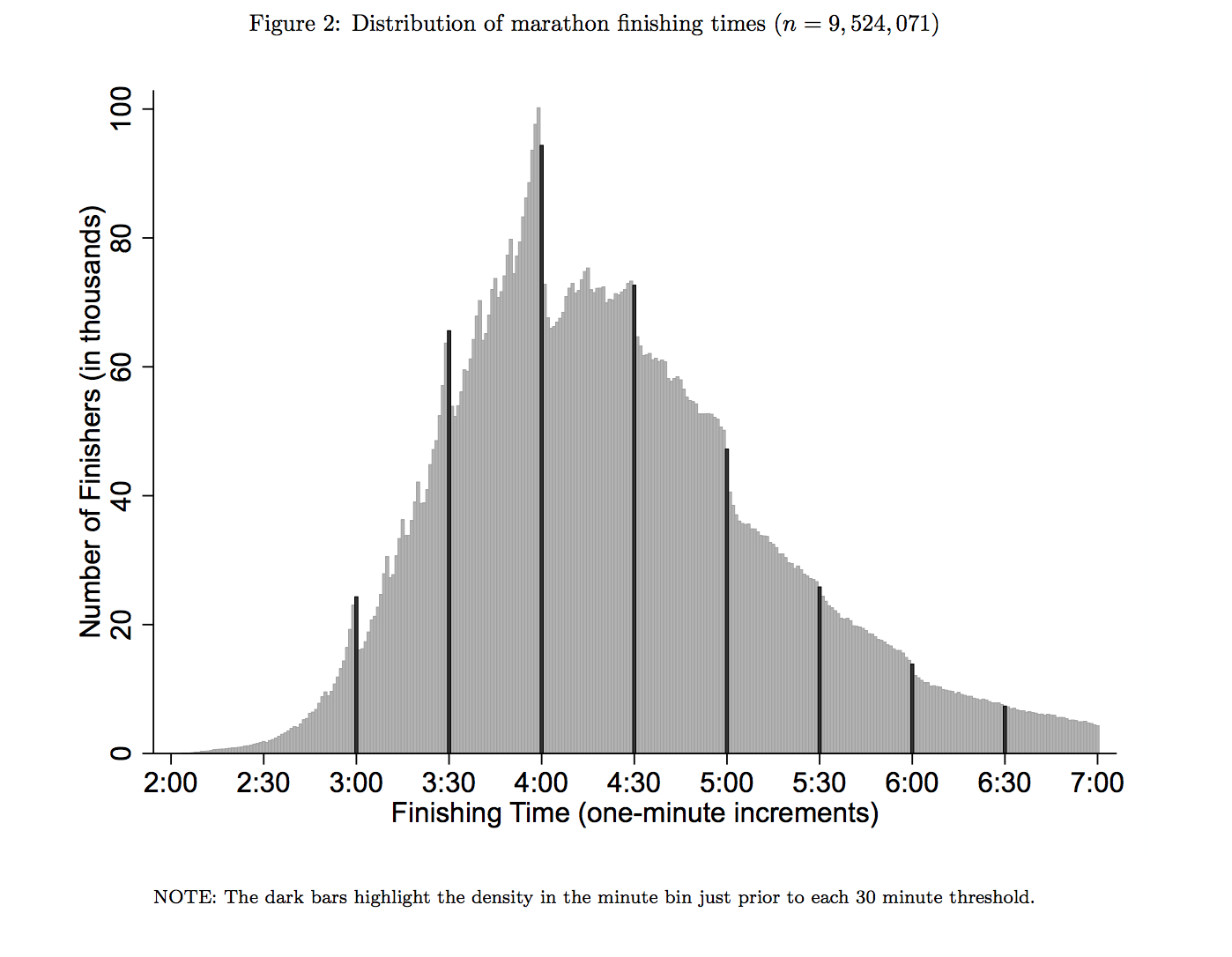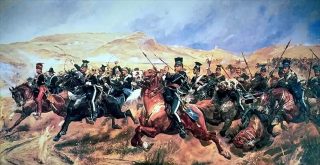Source: Reference-Dependent Preferences: Evidence from Marathon Runners
It is the distribution of marathon finishing times collected from over 9 million runners. You might expect to see a smooth bell curve centered around the average time, but that is not what is depicted here. The general outline of the bell curve is evident, but it is punctuated with discrete spikes. At each major time interval, there is a peak of finishers followed by a lull.
Anyone who has ever run a road race knows exactly what is going on here. As runners approach the finish line they tap into some hidden energy reserve and push themselves to finish under certain landmark times like 3:00 hours or 3:30. On one hand, this seems strange because these runners should be utterly exhausted at this point in the race. But we all know from our own human experience that no matter how exhausted or depleted we are, if we want something bad enough, we find the energy to achieve it.
This is the best evidence I’ve seen that exhausted people don’t lose energy as they approach goals, they gain it. So setting goals is a good idea, but is that all? Can we just stop there? Of course not. There are at least two other important factors that will help you get what you want.
The first is developing a system or process-goal that, when executed, moves you steadily toward your goal. Scott Adams, the creator of Dilbert, argues for something very similar in his book, How to Fail at Almost Everything and Still Win Big. According to Adams, systems are better than goals when it comes to changing behavior, and improving your life. Adams defines a system as something you do every day, while a goal is something you achieve in the future. Here is Adams:
“[O]ne should have a system instead of a goal. The system-versus-goals model can be applied to most human endeavors. In the world of dieting, losing twenty pounds is a goal, but eating right is a system. In the exercise realm, running a marathon in under four hours is a goal, but exercising daily is a system. In business, making a million dollars is a goal, but being a serial entrepreneur is a system.”
Process-goals have another huge advantage – they have the potential to form habits. Habits are one of the most powerful tools available to effect change in our lives, both positive and negative. If you can turn your process-goals into habits you’re virtually assured of meeting your ultimate goals. It’s just a matter of time and how fast you want to get there.
The second factor that will help you achieve your goal is purpose. Ask yourself, “why do I want to achieve this goal?” What is the greater purpose that is driving your desire? Identify a purpose beyond yourself and associate that purpose with the goal. Research shows you’re more motivated and more likely to eventually attain that goal.
For example I have a goal of maintaining my physical health. My process-goal is my daily morning workout. Everyday, no matter where I am, I workout in some way. Usually it’s a brisk 5 mile run, but sometimes it’s lifting weights or paddleboarding or even just walking the dog, but I do something active every day.
Some days are easy. I feel energized and I’m motivated to get into my routine right away. Other days are hard. Sometimes I just don’t feel like it. That’s where having a purpose really pays off. I have associated that process-goal with a purpose greater than myself.
In the case of exercise, I realized that in order to take care of my family, my business and my community, I have to first be healthy. If I’m not healthy, and operating at my peak, I can’t do all the other things to help the people around me whom I love. I used to think I didn’t have time to workout because I needed to spend time with my family, my business or other urgent pursuits. But by tapping into my purpose, I have inverted my priorities, and now health and fitness become first. I want to be around to watch my children grown up, therefore I take the time everyday to maintain health.
By tapping into that purpose I find the motivation to execute my process-goal everyday, which moves me toward my ultimate goal.
Sean P. Murray is an author, speaker and consultant in the areas of leadership development and talent management. Learn more at RealTime Performance.
Follow Me on Twitter: @seanpmurray111
Image: The Runner by Giuseppe Milo. Licensed under CC by 2.0.


